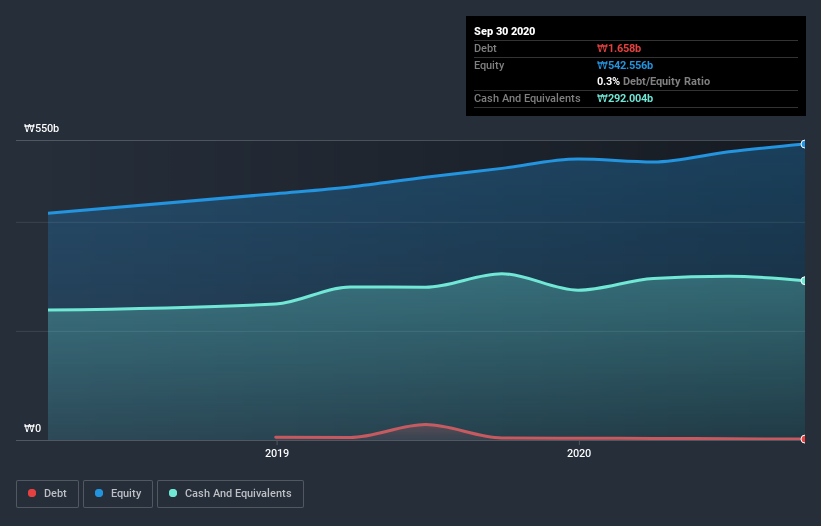Legendary fund manager Li Lu (who Charlie Munger backed) once said, 'The biggest investment risk is not the volatility of prices, but whether you will suffer a permanent loss of capital.' So it seems the smart money knows that debt - which is usually involved in bankruptcies - is a very important factor, when you assess how risky a company is. We can see that Hyundai Autoever Corporation (KRX:307950) does use debt in its business. But the more important question is: how much risk is that debt creating?
Why Does Debt Bring Risk?
Debt assists a business until the business has trouble paying it off, either with new capital or with free cash flow. Ultimately, if the company can't fulfill its legal obligations to repay debt, shareholders could walk away with nothing. However, a more frequent (but still costly) occurrence is where a company must issue shares at bargain-basement prices, permanently diluting shareholders, just to shore up its balance sheet. By replacing dilution, though, debt can be an extremely good tool for businesses that need capital to invest in growth at high rates of return. The first step when considering a company's debt levels is to consider its cash and debt together.
See our latest analysis for Hyundai Autoever
How Much Debt Does Hyundai Autoever Carry?
As you can see below, Hyundai Autoever had ₩1.66b of debt at September 2020, down from ₩3.88b a year prior. But on the other hand it also has ₩292.0b in cash, leading to a ₩290.3b net cash position.

How Healthy Is Hyundai Autoever's Balance Sheet?
Zooming in on the latest balance sheet data, we can see that Hyundai Autoever had liabilities of ₩419.8b due within 12 months and liabilities of ₩99.7b due beyond that. On the other hand, it had cash of ₩292.0b and ₩414.6b worth of receivables due within a year. So it actually has ₩187.1b more liquid assets than total liabilities.
This surplus suggests that Hyundai Autoever has a conservative balance sheet, and could probably eliminate its debt without much difficulty. Succinctly put, Hyundai Autoever boasts net cash, so it's fair to say it does not have a heavy debt load!
Also good is that Hyundai Autoever grew its EBIT at 12% over the last year, further increasing its ability to manage debt. The balance sheet is clearly the area to focus on when you are analysing debt. But it is future earnings, more than anything, that will determine Hyundai Autoever's ability to maintain a healthy balance sheet going forward. So if you want to see what the professionals think, you might find this free report on analyst profit forecasts to be interesting.
But our final consideration is also important, because a company cannot pay debt with paper profits; it needs cold hard cash. Hyundai Autoever may have net cash on the balance sheet, but it is still interesting to look at how well the business converts its earnings before interest and tax (EBIT) to free cash flow, because that will influence both its need for, and its capacity to manage debt. During the last three years, Hyundai Autoever produced sturdy free cash flow equating to 57% of its EBIT, about what we'd expect. This free cash flow puts the company in a good position to pay down debt, when appropriate.
Summing up
While we empathize with investors who find debt concerning, you should keep in mind that Hyundai Autoever has net cash of ₩290.3b, as well as more liquid assets than liabilities. On top of that, it increased its EBIT by 12% in the last twelve months. So is Hyundai Autoever's debt a risk? It doesn't seem so to us. There's no doubt that we learn most about debt from the balance sheet. However, not all investment risk resides within the balance sheet - far from it. Consider for instance, the ever-present spectre of investment risk. We've identified 1 warning sign with Hyundai Autoever , and understanding them should be part of your investment process.
At the end of the day, it's often better to focus on companies that are free from net debt. You can access our special list of such companies (all with a track record of profit growth). It's free.
When trading Hyundai Autoever or any other investment, use the platform considered by many to be the Professional's Gateway to the Worlds Market, Interactive Brokers. You get the lowest-cost* trading on stocks, options, futures, forex, bonds and funds worldwide from a single integrated account. Promoted
Valuation is complex, but we're here to simplify it.
Discover if Hyundai Autoever might be undervalued or overvalued with our detailed analysis, featuring fair value estimates, potential risks, dividends, insider trades, and its financial condition.
Access Free AnalysisThis article by Simply Wall St is general in nature. It does not constitute a recommendation to buy or sell any stock, and does not take account of your objectives, or your financial situation. We aim to bring you long-term focused analysis driven by fundamental data. Note that our analysis may not factor in the latest price-sensitive company announcements or qualitative material. Simply Wall St has no position in any stocks mentioned.
*Interactive Brokers Rated Lowest Cost Broker by StockBrokers.com Annual Online Review 2020
Have feedback on this article? Concerned about the content? Get in touch with us directly. Alternatively, email editorial-team (at) simplywallst.com.
About KOSE:A307950
Hyundai Autoever
Provides information and communication technology services in South Korea and internationally.
Flawless balance sheet with acceptable track record.
Market Insights
Community Narratives




